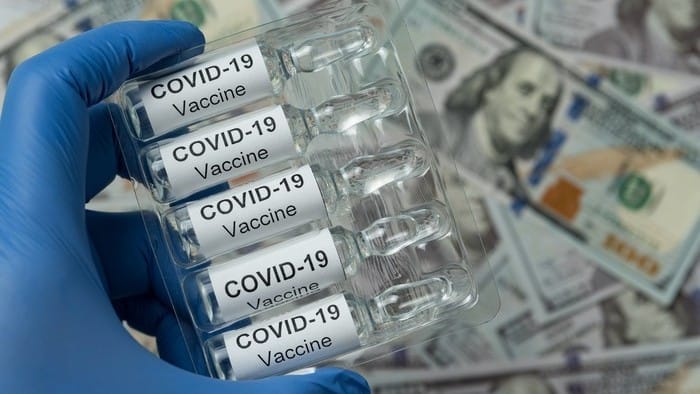This article was originally published on Fool.com. All figures quoted in US dollars unless otherwise stated.
One or more drugmakers with COVID-19 vaccines in development could make a fortune very soon. The global market for vaccines against the novel coronavirus could reach $20 billion next year.
When companies make fortunes, their investors can too. How should you invest in coronavirus vaccine stocks? Here are three simple steps to take.
1. Determine your risk tolerance
You want to make as much money from your investment as possible, but there's a key principle to be aware of with investing: To achieve higher returns, you must accept a higher level of risk. Before investing in coronavirus vaccine stocks, determine what your risk tolerance is.
Every stock has risks, but the ones you'll have to buy to profit from a coronavirus vaccine come with more uncertainty than most. That's especially true for small biotechs with no approved products on the market yet. Any setback can cause these biotech stocks to plunge.
The earlier a given drugmaker's pipeline candidates are in the clinical development process, the riskier its stock. For example, a COVID-19 vaccine candidate that's in preclinical testing has a much higher chance of failure than one that has sailed through to late-stage clinical testing in humans. Also, the more pipeline candidates that a company has, the less risky it tends to be.
Buying shares of large pharmaceutical companies presents a lower risk level. These drugmakers already have multiple approved products on the market and generate significant revenue. Many of them are quite profitable. Although a stumble for their COVID-19 vaccine candidates would cause their shares to fall, it probably wouldn't result in the stock crashing.
2. Identify stocks that fit your investing style
Once you've objectively assessed how much risk you're willing to take on, the next step is to identify the stocks that best fit your investing style. Below are some ideas based on three risk-tolerance levels.
Lower risk tolerance
The following three big pharma stocks are developing COVID-19 vaccine candidates and are worthy of consideration by investors with low risk tolerance levels:
| Company |
Market Cap |
COVID-19 Vaccine Status |
|---|---|---|
| AstraZeneca (NYSE: AZN) | $141.3 billion | In phase 3 testing |
| Johnson & Johnson (NYSE: JNJ) | $393.7 billion | Phase 3 testing to begin in September |
| Pfizer (NYSE: PFE) | $202.3 billion | In phase 2/3 testing |
Data sources: Yahoo! Finance and company press releases. Market caps as of Sept. 3, 2020.
Pfizer is developing COVID-19 vaccine candidate BNT162b2 with its partner, BioNTech. The companies expect to seek emergency-use authorisation for the vaccine from the Food and Drug Administration in October 2020.
More risk tolerance
The following drugmaker stocks have at least one pipeline candidate in late-stage testing (lowering their risk), but don't yet have approved products on the market (increasing their risk):
| Company |
Market Cap |
COVID-19 Vaccine Status |
|---|---|---|
| Inovio Pharmaceuticals (NASDAQ: INO) | $1.7 billion | Plans to soon begin phase 2/3 testing |
| Moderna (NASDAQ: MRNA) | $25.6 billion | In phase 3 testing |
| Novavax (NASDAQ: NVAX) | $6.3 billion | In phase 2 testing |
Data sources: Yahoo! Finance and company press releases. Market caps as of Sept. 3, 2020.
Among these three biotechs, Moderna has raked in the most external funding for its COVID-19 vaccine candidate, including up to $2.48 billion from the US government.
Highest risk tolerance
Here are two clinical-stage biotech stocks with no late-stage programs that only investors with the highest risk tolerance might consider:
| Company |
Market Cap |
COVID-19 Vaccine Status |
|---|---|---|
| Altimmune Therapeutics (NASDAQ: ALT) | $441 million | In preclinical testing |
| Vaxart (NASDAQ: VXRT) | $568 million | Awaiting FDA approval to begin phase 1 testing |
Data sources: Yahoo! Finance and company press releases. Market caps as of Sept. 3, 2020.
Vaxart has one of the most intriguing COVID-19 vaccine candidates because it is administered in tablet form, rather than via injection.
3. Evaluate the companies' other opportunities and challenges
Finally, make sure you check out other business opportunities and challenges for any coronavirus vaccine stock you're considering. For example, all of the companies mentioned have other pipeline candidates.
You might find that there could be compelling reasons to think about buying a stock even if its COVID-19 vaccine flops. AstraZeneca is a case in point. The big drugmaker claims several blockbuster franchises with strong growth prospects, plus a pipeline loaded with potential winners.
Buy and watch
Once you've completed these three steps, you're ready to invest. Keep in mind, though, that coronavirus vaccine stocks require monitoring. Their prospects change frequently with clinical study results and news of government reimbursements. Some might very well prove to be stocks you can buy and hold for years, but you need to watch them closely.
This article was originally published on Fool.com. All figures quoted in US dollars unless otherwise stated.









